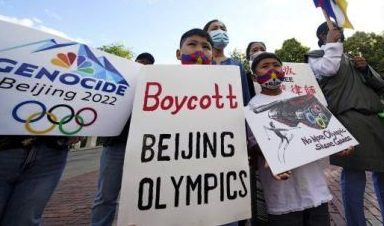Amidst growing Human Rights issues in China, countries like Japan and U.S. have are using the Olympics as a sort of political ping-pong game to showcase their disagreement.
Japan has said it won’t dispatch a government delegation to the Olympic event, but refused to call it a boycott. Probably because of diplomatic reasons, as China is Tokyo’s largest trading partner.
On the other hand there are countries who have openly announced a diplomatic boycott of the games.
The United States, United Kingdom, Canada and Australia will refrain from sending government representatives to the Games to protest Beijing’s treatment of its Uyghur Muslim minority and policies towards Hong Kong, and Tibet.
In January, India made it clear that it would be joining hands with U.S. and other European countries in the boycott. Indian stance comes even as the border row with China continues. Last year India lost 20 of its soldiers due to Chinese army’s actions in Galwan Valley.
India’s decision to support is mainly symbolic, and its biggest team at the Winter Olympics has been of four athletes. This time, a skier from Kashmir, Arif Khan, is the sole qualifier.
Skier Arif Khan, the only athlete representing India at the 2022 Beijing Winter Olympics, left for the Games in the Chinese capital along with Chef De Mission Harjinder Singh and support staff.
Indian Olympic Association (IOA) president Narinder Batra wished the contingent luck before its departure for the Games on Monday.
Arif, who will participate in two events, is aiming a modest top-30 finish in the showpiece that begins on Friday.
As a reply to the resolution passed by Japanese parliament, the China’s foreign ministry said that the resolution “ignores the facts, maliciously slanders China’s human rights situation, seriously violates international law and basic norms governing international relations, grossly interferes in China’s internal affairs, and is extremely egregious in nature.”
There have long been competing views among Japanese politicians about the approach to China. The conservatives are hawkish on China policy, and seem concerned primarily with defence issues. Others have pushed to preserve Japan’s deep economic ties with its neighbour.
The parliamentary resolution called on the Japanese government to work with the international community in addressing the issue.
“The government should collect information to grasp the whole picture … , monitor the serious human right situation in cooperation with the international community, and implement comprehensive relieving measures,” it said.
The resolution did not directly use the word “China” anywhere in the text, and steered clear of such expression as “human rights violation”, saying, instead, “human rights situation”, in a possible nod to close bilateral economic ties.
Japan must tread carefully because it relies on China not only as a manufacturing hub, but also as a market for items from automobiles to construction equipment.
The U.S. Senate passed a bill to ban imports from China’s Xinjiang region, in response to concerns over forced labour and other human rights abuses. However, China denies the allegation.
Defying calls from the close allies like United States and Britain for a political boycott, India has sided with Russia in supporting the China’s hosting of the Winter Olympics.
According to the sources, Russian President Vladimir Putin and Pakistan PM Imran Khan are likely to attend the inaugural ceremony in Beijing.
Content writer: Nishant Mishra



